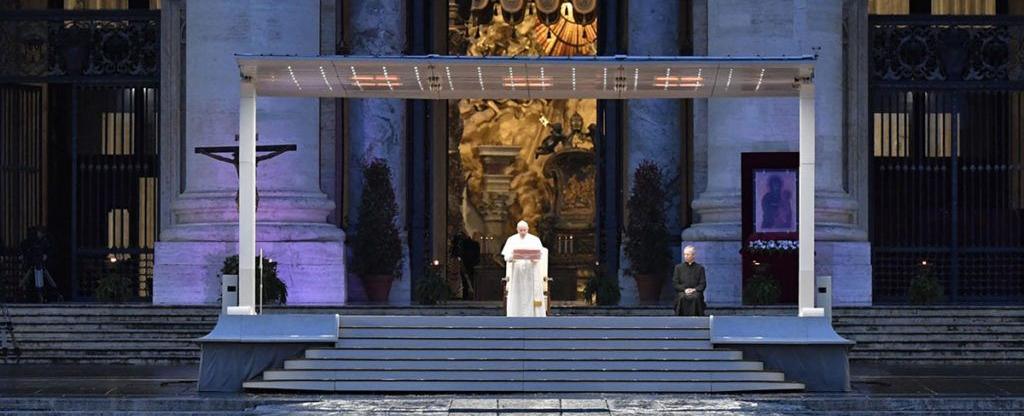"Lead, Kindly Light": Trusting God in the Midst of a Pandemic

One of the most important turning points in John Henry Newman's life involved contracting an illness (probably typhoid fever) while on a trip to Sicily in 1833. Newman was accompanied on the trip by his best friend, Hurrell Froude, and Froude's father, Robert. After visiting Sicily, Naples, and Rome, Hurrell and his father began the return trek home—as had originally been planned—but Newman made a spur of the moment decision to return to Sicily. It was here that Newman became seriously ill, to the point that it looked like he might die.
After recovering, Newman looked back on these events with an eye to God's involvement in them. He came to believe that God had used the sickness, in part, to curb his willfulness. Ironically, the day prior to leaving for the trip, Newman had preached a sermon against willfulness (see "Willfulness, the Sin of Saul"). From his post-illness vantage point, he was convicted that in impetuously deciding to travel alone he had acted willfully, that is, without proper consideration of God's leading in the matter.
Someone unfamiliar with the details of Newman's life, on the basis of what I have shared thus far, might assume that Newman viewed his sickness only in a negative light. As Roderick Strange points out, however, that was not the case. Rather, Newman spoke of this turn of events as "a strange providence."[1] What Newman seemed to mean by strange providence is that God worked through the illness to accomplish an unexpected end. Note, Newman did not say, "I sinned and, therefore, God punished me." His outlook was more nuanced than that. Roderick Strange explains:
"[From Newman's vantage point,] God is good and everyone is in his presence. All the same, crises occur as that presence is neglected or forgotten. This, he said, 'is often the state in which persons find themselves on falling into trouble. The world fails them, and they despair, because they do not realize to themselves the loving-kindness and the presence of God' (PS iii, 117). Their fortunes begin to change when they rediscover that presence. The rediscovery makes it seem like a new truth, and it is that rediscovery that is providential."[2]
While not ruling out a natural explanation for his illness, Newman nonetheless confessed that spiritual fruits arose out of it. This particular physical ailment served an important purpose in his life because it laid bare the folly of his own willfulness and thus caused him to practice renewed trust in God's leading. As Strange highlights, what was providential was not the suffering qua suffering, but the way that it helped Newman to rediscover God's presence in his life.
In the wake of his illness, while on the return voyage to England, Newman composed his famous poem "The Pillar of the Cloud (see page 156)," more widely known today under the title of "Lead, Kindly Light." Convinced that his life had been spared because the Lord still had a work for him to do in England, Newman penned a moving tribute to God's providential care:
Lead, Kindly Light, amidst th'encircling gloom,
Lead Thou me on!
The night is dark, and I am far from home,
Lead Thou me on!
Keep Thou my feet; I do not ask to see
The distant scene; one step enough for me.
Amidst our own difficult circumstances in dealing with this unexpected pandemic, we are understandably disoriented by the terrible events taking place around us. Without settling on simplistic answers, one spiritual discipline worth considering during this time is to make a habit of reciting Newman's prayer. Prior to these circumstances, perhaps we placed an inordinate amount of trust in our own resourcefulness or in purely human solutions. If that is the case, now is a prime opportunity to let go of our self-reliance and to ask the Kindly Light, our Loving Creator, to keep our feet and lead us amidst th'encircling gloom.
One final caveat: it would be foolhardy, of course, to try to say with certainty what the providential purpose behind our present circumstances might be. Just as the disciples were wrong to think that a man's blindness was caused by some sin (Jn 9:2), we would be imprudent (and theologically misguided!) to offer hard and fast conclusions about why God is allowing this to happen. For one thing, we know from Sacred Scripture that God hates illness and death as much as we do. A key part of Jesus's ministry was healing the sick, and St. Paul, later in the New Testament, speaks of death as the final enemy that God will defeat (1 Cor 15:54-57). For another, our own perspective is extremely limited. As finite human beings, we will likely never understand why certain occurrences happen, and we should make it a point not to assign reasons to events that are simply tragic or evil.
While affirming all of the above to be true, Christians at the same time believe that God allows (not causes) temptations and trials in our lives in order to increase our faith. In fact, the book of James says that we ought to "consider it pure joy" whenever we face trials of many kinds because we know that "the testing of [our] faith produces perseverance" (Js 1:2-3). With that in mind, let us approach this time of trial with a view to how God's "strange providence" might be bringing our attention back to important truths that we might have previously overlooked or underappreciated. And let us pray with Newman not to see the distant scene, but to be content with God leading us one step at a time.
[1] John Henry Newman, Autobiographical Writings, ed. Henry Tristram (London: Sheed & Ward, 1968), 121.
[2] Roderick Strange, Newman 101 (Notre Dame, IN: Christian Classics, 2008), 118.
Ryan Marr
Associate Provost at Mercy College of Health Sciences, Iowa
Ryan ("Bud") Marr Associate Provost at Mercy College of Health Sciences. He has served as the Director of NINS and Associate Editor of the Newman Studies Journal from 2017-2020. He is the author of To Be Perfect Is to Have Changed Often: The Development of John Henry Newman's Ecclesiological Outlook, 1845–1877 (Rowman & Littlefield, 2018), and has also contributed essays to Newman and Life in the Spirit (Fortress Press, 2014), Learning from All the Faithful (Pickwick, 2016), and The Oxford Handbook of John Henry Newman (Oxford University Press, 2018). His research interests include the life and writings of John Henry Newman, ecclesiology, and the reception of Vatican II.
QUICK LINKS

